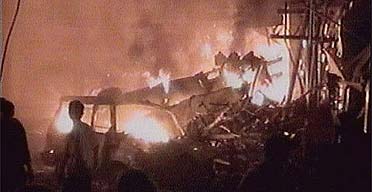At least 182 people are dead after a car bomb destroyed a nightclub on the tourist island of Bali in the worst terrorist act in Indonesia's history.
Many of the dead were Australians and other foreigners in a blast that also left more than 300 wounded. National police chief General Da'i Bachtiar said the explosion came from a Kijang, a jeep-like vehicle.
At least two Britons are believed to be among the dead, with another 27 injured in the blast, Britain's ambassador to Indonesia, Richard Gozney said, adding that 15 British nationals in Bali were unaccounted for.
Britain condemns attack
A spokesman for 10 Downing Street said that the prime minister, Tony Blair, "completely and utterly condemns this appalling terrorist act", while the foreign secretary, Jack Straw, described the bombers as "evil and perverted people who think that some political aim of theirs can be achieved by attacking mainly young people who are enjoying themselves and also in turn contributing a great deal to the Indonesian economy".
The government advised Britons not to travel to Bali and only to undertake essential travel to the rest of Indonesia.
No one admitted carrying out the devastating attack, but the explosion came days after the Bush administration issued a worldwide alert for terror attacks.
'People are yelling and screaming'
Witnesses and police described two blasts - a small one in the Paddys discotheque followed several minutes later by a far more powerful one outside the Sari Club, a popular nightspot for foreigners. Australians, Germans, Canadians, Britons, Swedes and Indonesians died in the second blast.
The bomb left a large crater at the entrance to the nightclub, located in the centre of Kuta, Bali's biggest tourist area and a maze of clubs, restaurants, shops, hotels and beach bungalows. The explosion ignited a huge blaze - apparently caused by gas cylinders - which made the flimsy roof structure collapse, trapping hundreds inside. Bali police chief Brigadier General Budi Setyawan said most of the victims were Australians.
An Australian tourist, Rachael Hughes, 18, said she and her boyfriend had just arrived in Kuta Beach when the blast ripped through the nightclub, smashing the window of their hotel room.
"Looking outside ... people are yelling and screaming, they are all going: 'They are all going to die,' " she said. "Standing in the foyer of the Bounty Hotel, people were just walking in, blood dripping off them, burns to their face, skin coming off them."
Wayan Putra, a hotel driver, said that after the blast hundreds of residents of the town had rushed towards the club but could not get close because of the intensity of the blaze. Dozens of injured people were evacuated by moped drivers who normally ferry tourists from one part of the resort to another.
Ambulances also arrived. The blaze was extinguished several hours later.
"It was horrible. I am devastated. Bali has always, always been safe. We depend on tourism for our livelihood. Our name has been smeared by this horrible blast," Mr Putra said.
Fears of al-Qaida role
A third bomb exploded almost simultaneously near the island's US consular office, the authorities said, but there were no casualties.
The explosions highlighted fears by the US and others that Indonesia is being targeted by al-Qaida operatives. In September, the US embassy in Jakarta closed for six days because of terror threats linked to al-Qaida. Last month, a hand grenade exploded in a car near a house belonging to the US embassy in Jakarta, killing the man suspected of handling it.
Other US embassies in the region were also closed. The Philippines disclosed that the US government feared attacks using truck bombs.
President vows to combat terror
President Megawati Sukarnoputri, whose government has been accused by the US and its neighbours of being slow to respond to the terror threat, flew to Bali and promised to cooperate with the international community in fighting terrorism.
The authorities in Malaysia and Singapore have alleged that members of Jemaah Islamiya - an al-Qaida-linked group seeking to set up an Islamic state in South-east Asia - are based in Indonesia, the world's most populous Muslim country.
Several countries have pressed Indonesia to arrest Jemaah Islamiya's alleged leader, Abu Bakar Bashir. But Indonesia says it has no evidence against Mr Bashir, who has sympathisers in Ms Megawati's government.
"The bombings, once again, should be a warning for all of us that terrorism constitutes a real danger and potential threat to national security," Ms Megawati said.
Asked about the suspected origins of the bombers or a possible link to al-Qaida, she said: "That will be continuously investigated so that this can be uncovered as soon as possible."
A tearful Ms Megawati later visited the site with security ministers and top generals. A security alert was declared across the country, which sprawls across 13,000 islands.
Security minister Susilo Bambang Yudhyono said strategic targets, such as liquefied natural gas plants, "will be protected".
The Australian prime minister, John Howard, said he would launch an urgent review of national security. Australia, a staunch Washington ally, has been on a heightened state of alert since the attacks on September 11 2001.
"People should get out of their minds that it can't happen here; it can, and it has happened to our own on our doorstep," Mr Howard said.
